If you are a first-time visitor to Tunisia, you might be wondering what currency is in use in Tunisia. In addition, you might be thinking of many money-related topics. In this post, I am going to talk about money. I cover topics such as currency in Tunisia, what currency is the best to bring to Tunisia, what closed currency means, ATMs, paying by card, how to exchange currency, and how to bargain like a real Tunisian.
Here’s another money guide that will help you to make a travel budget for Tunisia.
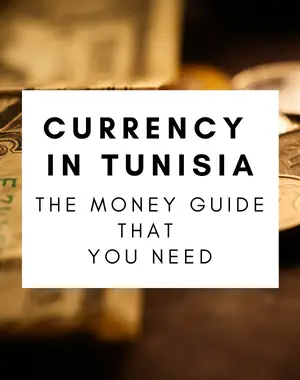
Currency in Tunisia: Bills and coins
The national currency is called the Tunisian dinar, with the Latin symbol DT and the currency code TND. The most used notes are 5, 10, 20, and 50 dinars. The coins in use are ½, 1, 2, 5 dinars, and 50, 100, and 200 millimes. One dinar equals 1000 millimes.
Tunisian currency is closed currency - what does it mean?
The Tunisian dinar is a closed currency. Now, I will explain more about what it means, how it affects you, and what you should take into consideration.
A closed currency is a currency that isn’t available outside its country of origin. In this case, the meaning is that the Tunisian dinars are only available in Tunisia. You can’t purchase dinars in advance from your home country and bring those to Tunisia. Actually, importing and exporting Tunisian dinars is illegal. As a result, currency exchange is only possible at the destination in Tunisia, and you should spend the remaining cash before leaving the country.
Why do countries have closed currency?
A closed currency is used in countries with developing economies to control the inflow and outflow of money. Generally, the country needs money and can’t afford an enormous outflow of currency. In addition, the exchange rate remains more stable. A negative side-effect is the creation of black markets for the currency exchange market with higher exchange rates.
In conclusion, you have three things to remember. Do not purchase dinars in advance from your home country, even if you find a place where that currency is available. And secondly, spend the remaining cash before leaving the country. Lastly, don’t exchange money in the black market, although a better exchange rate may seem attractive.
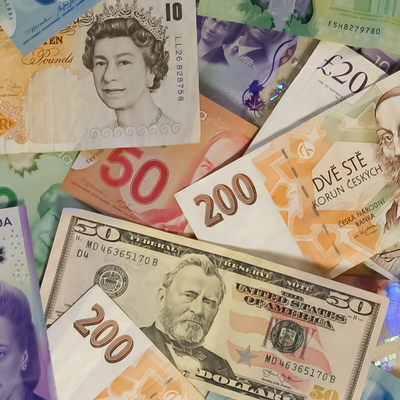
What's the best currency to bring to Tunisia?
Which one is the best currency to travel with depends on the destination. The ultimate goal is to carry foreign currency that is easy to exchange with the best possible exchange rate. In some countries/places, you might be able to pay with a foreign currency. The most widely used and usually also in high-demand currencies are Euros, British Pounds, Japanese Yen, and the US dollar.
As I mentioned before, traveling with Tunisian Dinars is not possible. For this reason, the best currencies to bring to Tunisia are Euros, British Pounds, and US dollars which are the easiest to exchange. It’s possible to swap many other currencies, but not as widely. How about is it possible to pay with foreign currency? There isn’t a clear answer for this one. In some touristy places, for example, Hammamet, and Sousse, it will be possible to pay for your stay in the hotel, dinner in a restaurant, and shopping with Euros, Pounds, and US dollars. But to be honest, I find it much more convenient and easier to have local currency in my pockets.
Instead of traveling with foreign currency, a credit card might be the best way to travel with money. Of course, this depends on what kind of credit card you have and bank policies. So, before you get too comfortable withdrawing from ATMs, check with your bank how much money you need to pay for using ATMs abroad and pay attention to possible currency exchange fees.
Payment methods in Tunisia - currency in Tunisia
The best payment method in Tunisia is cash (Tunisian Dinar). Also, it’s the most common way to pay for purchases. In some places, they accept only cash. In addition, the advantage is that the cash payment is immediate if we compare it to card payments. On the other hand, it’s not the most secure form of payment. Losing cash for one reason or another is possible, and then it’s gone for good.
The best cashless payment option in Tunisia is card payment. Especially debit or credit cards from a big bank are most likely to be accepted. The cards part of the international ATM network ( Visa, Mastercard) enable withdrawing money abroad. In Tunisia, you can usually pay by card when making a big purchase at once or shopping in malls and international clothing shops. Cash payment is better in restaurants, cafes, bars, small boutiques, and souks.
Most digital payment methods, such as in-app and online payments, or mobile phone transfers like PayPal, aren’t in use yet. In some places, you might be able to pay Apple Pay or Google Pay, but I wouldn’t rely on those.
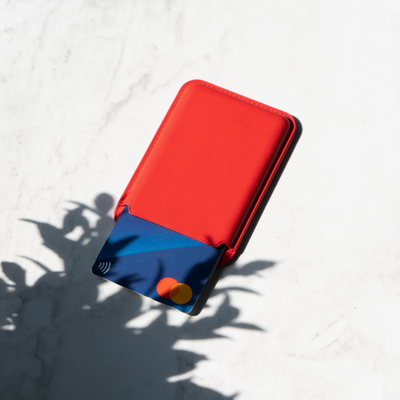
How to get your Tunisian dinars? - currency in Tunisia
One of the cheapest ways to get local currency in Tunisia is to use ATMs. Instead of exchanging money, I prefer to use ATMs. For me, this is the fastest and easiest way. This way, I don’t travel with plenty of cash.
When using ATMs abroad, your card provider automatically converts your home currency to local currency. But, be aware of possible foreign transaction fees. It’s better to contact your bank and ask about fees that might occur when using and withdrawing money abroad. In addition, you need to pay an ATM usage payment of 10DT in Tunisia. The machine tells you the fee in dinars before you confirm the withdrawal.
So, how to use ATMs in Tunisia? Firstly, you can withdraw only Tunisian dinars. ATMs are easy to use with a couple of language options. The challenges you might face are a low withdrawal limit, a machine malfunction, or there’s no money left. There are numerous ATMs available in bigger cities. So, if the ATM isn’t working, you will find another machine nearby.
At last, there are differences between the cards. Get to know the characteristics of the debit/credit cards, such as possible withdrawal limits and country restrictions. Block the card if your card is lost or stolen or an ATM seizes it abroad. Usually, blocking is done by the mobile bank or by calling the blocking service.
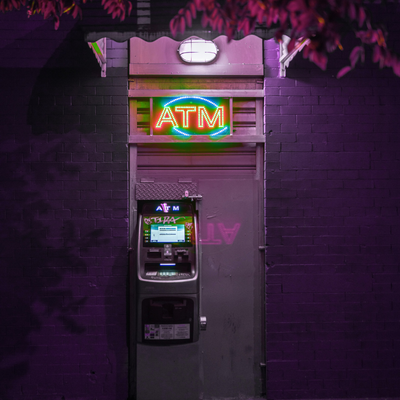
Are ATMs safe to use?
Using an ATM is safe in Tunisia, but I would like to share safety tips that are useful when withdrawing money abroad. If possible, do the withdrawal during the daytime. Prefer ATMs located inside or in connection with well-known banks. Otherwise, choose a somewhat busy street and pay attention to the surroundings.
Exchanging money in Tunisia
First, compare the exchange rate between companies to get the best deal for you. Also, pay attention to possible additional fees and tips. Depending on the office, you might be able to pay the exchange with a credit card then the cash is not needed. Always count the received money and check that the amount matches the receipt. Also, save the receipt. This is the way to prove you exchanged the money through an official channel.
So, where to exchange currency in Tunisia? Inexpensive currency exchange services are available in banks, credit unions, currency exchange stores, and online currency bureaus. I haven’t used online services for exchanging money, so I can’t recommend which one to use. Share the word in the comments if you know a good and trustworthy online currency service.
Where not to exchange money?
The worst place to change money is at the airport, as they often have some of the worst exchange rates. On the other hand, it’s a safe place to do the exchange. If needed, exchange only a small amount of money at the airport (just for transportation), or don’t exchange at all. Don’t either exchange your money with an unauthorized dealer. It’s important to understand that exchanging money always means losing some money to you. Even though you bargain like never before.
Can I bargain or haggle prices in Tunisia? - currency in Tunisia
Haggling is an ordinary social activity in Tunisia. I understand that it might feel awkward if you are not used to it. But it is a big part of shopping, especially in souks in Medina, so get ready for it. Most of the time, there is room for a bargain, so here are a couple of tips to help you out.
- Haggling is supposed to be fun, so don’t take it too seriously. My friend, don’t forget to smile.
- Start bargain only if you are willing to buy the item.
- Don’t bargain in chains (Zara, H&M, LC Waikiki, Carrefour) and markets where they sell fruits, bakery products, fish, and meat.
- Tunisians are full of passion and emotions, which you will notice when bargaining with them. Big emotions are part of the process.
- You can always say thank you for your time and leave if you are not pleased with the deal.
- Continue to negotiate until you find a price that fits both.
I hope this money guide covers most of the things you need to know about currency in Tunisia. Let me know in the comments if you have some questions. See you again next week!
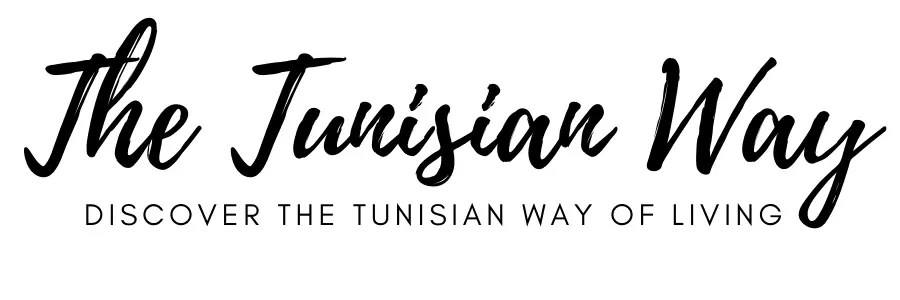
Please, do they have contactless ATMs in Tunisia?
Hi Maca!
I had to google what is a contactless ATM 😀 No, I haven’t seen contactless ATMs in Tunisia yet.
BR,
Hanna
Thank you, this information on Tunisia money was a great help and has given me a great insight fir when my wife and I visit in February next year…once again thank you.
Thank you for your kind words and I am glad to hear that the article was helpful!
Have a wonderful stay in Tunisia!
BR,
Hanna